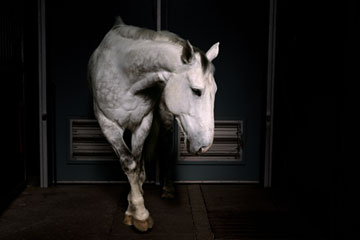
Horses can lapse into apparent depression when they lose a companion.
(2 of 6)
Animals are social creatures just like we are. They form relationships that for them are every bit as important as ours are to us, which means that at some point they must experience the end of them. "They're bonded like us," says Barbara King, professor of anthropology at the College of William and Mary and author of the new book How Animals Grieve. "We're all socially attuned, and in many ways our brains are even wired similarly. Why wouldn't animals mourn?"
If they indeed do so, the mechanisms at work may be the evolutionary precursors of our own grief process. "It's easy to see why these rituals would have evolved," says Marc Bekoff, professor of evolutionary biology at the University of Colorado. "It's a wake. They're reinforcing the feeling that things will be O.K., just like grieving human families tell themselves the same thing."
Bekoff and King are among the leaders of a growing group of researchers exploring the question of whether animals mourn. It's not one that can be answered empirically yet--no conclusive lab tests or brain scans exist, though some preliminary ones do. It's dependent instead on the growing body of observations pouring in from researchers in the field, from wildlife managers at zoos and even from pet owners, all struck by the pained and poignant behavior of the animals around them. The beasts, it seems, are suffering--and in ways we recognize well.
The Methods of Mourning
Grief, like animals, comes in multiple species, and as with so many things, it's the human variety that's the most complex. For us, the loss of a loved one inflicts a pain like no other. "Gut me," King quotes journalist Roger Rosenblatt writing in a book about the death of his adult daughter. "Slice me down the earth's meridian from north to south. Lay my bones outside my skin." It's a terrifying description as much because of its visual awfulness as because of the fact that it captures the experience. The rituals we build around that torment--the gathering in rooms, the bowing of heads, the paradoxical laughter at the wake, often with the deceased as the foil--medicate the pain and ease the passage.
No one pretends that grief in animals is anywhere near as complex. For starters, they don't have the brainpower for the long reflection and obsessive remembering that makes grieving such a slow process for us. More important, they couldn't afford to indulge it even if they did. "Most animals are preoccupied with surviving," says Marzluff, who is also the co-author of Gifts of the Crow. "Mother Nature is harsh, and if there's value in dealing with a death, there's also value in moving beyond it quickly, otherwise you're going to get weeded out."
Instead, what researchers point to in identifying animal grief is a suite of observable behaviors familiar to anyone experiencing loss or depression--listlessness, lack of appetite, weight loss. "I'm looking for something prolonged, something visible," says King. "I don't think it's productive to ask if animals really understand death, since there's no way we can know that. I'm just interested in what we can see."
